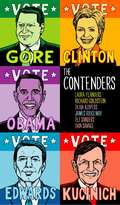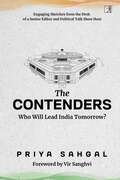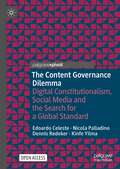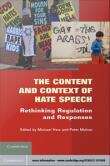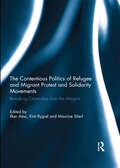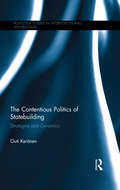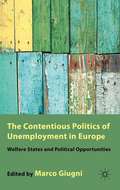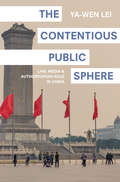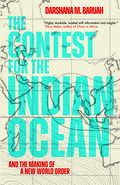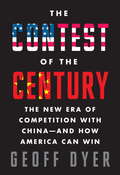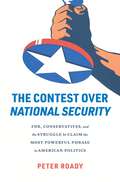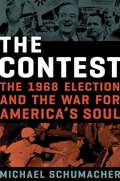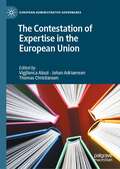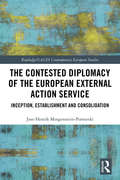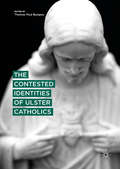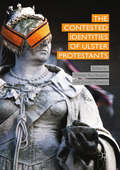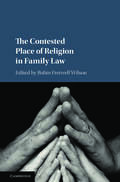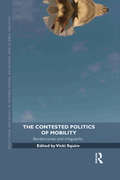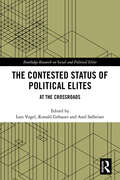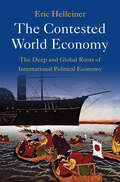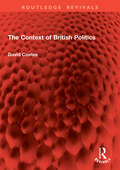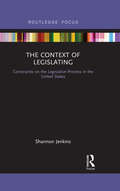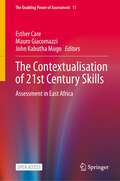- Table View
- List View
The Contenders
by James Ridgeway Dean Kuipers Richard Goldstein Laura Flanders Eli SandersWhen you get beyond the spin, the campaign spending, the YouTube spots, and the paid advertisements, what did the Democratic contenders in the 2008 Presidential election stand for, really? What did Hillary Clinton learn from Nixon? What does Barack Obama have in common with Justin Timberlake? Who are the two John Edwardses? Is America ready for the vegan presidency of Dennis Kucinich? What makes Al Gore rock and roll? Why do Joe Biden, Christopher Dodd, Bill Richardson, and Mike Gravel bother? Find out in this irreverent guide to the 2008 presidential candidates.
The Contenders: Who Will Lead India Tomorrow?
by Priya SahgalA Simon & Schuster eBook. Simon & Schuster has a great book for every reader.
The Content Governance Dilemma: Digital Constitutionalism, Social Media and the Search for a Global Standard (Information Technology and Global Governance)
by Nicola Palladino Edoardo Celeste Kinfe Yilma Dennis RedekerThis open access book is one of the first academic works to comprehensively analyse the dilemma concerning global content governance on social media. To date, no single human rights standard exists across all social media platforms, allowing private companies to set their own rules, values and parameters. On the one hand, this normative autonomy raises serious concerns, primarily around whether companies should be permitted to establish the rules governing free speech online. On the other hand, if social media platforms simply adopted international law standards, they would be compelled to operate a choice on which model to follow, and put in place mechanisms to uphold these general standards. This book examines this topic from a multidisciplinary perspective, drawing from the expertise of the authors in law, political science and communication studies. It provides a carefully reconstructed theory of the content governance dilemma, as well as pragmatic solutions for companies and policymakers. In this way, the book not only benefits academics by advancing the debate on content moderation issues, but also informs new policies and regulatory strategies by offering an up-to-date overview of rules and tools for content moderation, as well as an evaluation of their current level of compliance with standards emerged in international human rights law and digital constitutionalism initiatives.
The Content and Context of Hate Speech
by Michael Herz Peter MolnarThe contributors to this volume consider whether it is possible to establish carefully tailored hate speech policies that are cognizant of the varying traditions, histories, and values of different countries. Throughout, there is a strong comparative emphasis, with examples (and authors) drawn from around the world. All the authors explore whether or when different cultural and historical settings justify different substantive rules given that such cultural relativism can be used to justify content-based restrictions and so endanger freedom of expression. Essays address the following questions, among others: Is hate speech in fact so dangerous or harmful to vulnerable minorities or communities as to justify a lower standard of constitutional protection? What harms and benefits accrue from laws that criminalize hate speech in particular contexts? Are there circumstances in which everyone would agree that hate speech should be criminally punished? What lessons can be learned from international case law?
The Contentious History of the International Bill of Human Rights
by Christopher N. J. RobertsToday, the idea of human rights enjoys near-universal support; yet, there is deep disagreement about what human rights actually are - their true source of origin, how to study them, and how best to address their deficits. In this sweeping historical exploration, Christopher N. J. Roberts traces these contemporary conflicts back to their moments of inception and shows how more than a half century ago, a series of contradictions worked their way into the International Bill of Human Rights, the foundation of the modern system of human rights. By viewing human rights as representations of human relations that emerge from struggle, this book charts a new path into the subject of human rights and offers a novel theory and methodology for rigorous empirical study.
The Contentious Politics of Refugee and Migrant Protest and Solidarity Movements: Remaking Citizenship from the Margins
by Ilker Ataç, Kim Rygiel and Maurice StierlOver the past two years, large-scale migratory movements to Europe have gained worldwide attention, and have prompted ever-greater desires to govern and control them. At the same time, we have seen the emergence of political struggles for rights to movement and demands for greater social justice, in both the global ‘north’ and ‘south’. Throughout the world, political mobilizations by refugees, irregularized migrants and solidarity activists have emerged, demanding and enacting the right to move and to stay, struggling for citizenship and human rights, and protesting the violence and deadliness of contemporary border regimes.This collection brings together articles that explore political mobilizations in several countries and (border) regions, including Brazil, Mexico, the United States, Austria, Germany, Greece, Turkey and ‘the Mediterranean’. Many of these political mobilizations can be understood as transnational responses to processes of regionalization and the intensification of restrictive border regimes across the globe, and as illustrative of what might be referred to as a ‘new era of protest’.
The Contentious Politics of Statebuilding: Strategies and Dynamics (Routledge Studies in Intervention and Statebuilding)
by Outi KeränenThe book examines the dynamics between domestic and international statebuilding actors. While the dynamics between "local" and "international" statebuilding actors have been previously theorised through concepts such as hybridity and friction, there have been few attempts to develop conceptual tools for the empirical study of statebuilding dynamics. By drawing on a set of concepts and mechanisms developed in the Contentious Politics literature, this book fills this gap. It deploys concepts such as political opportunity structures, mobilizing structures and framing to trace the interactions between domestic and international statebuilding actors in the case of post-conflict Bosnia and Herzegovina. The analysis identifies a set of practices operating at various domains of Bosnia’s society—institutional, symbolic and discursive—through which domestic statebuilding actors seek to influence the internationally-driven statebuilding process. Responses by the international statebuilding actors to such activities have often resulted in further contention. The book argues that the dynamics between the different statebuilding actors and agendas in the Bosnian case are characterised not only by conflict and contention but also symbiosis whereby the presence of non-conforming local actors justifies the extension of international mandates while the continued international presence generates further contestation. These observations and the conceptual tools introduced in the book add to our understanding of the often slow and arduous statebuilding processes in post-conflict societies. This book will be of much interest to students of statebuilding, peacebuilding, European politics and international relations in general.
The Contentious Politics of Unemployment in Europe
by Marco GiugniThis book provides a novel approach to unemployment as a contested political field in Europe and examines the impact of welfare state regimes, conceived as political opportunity structures specific to this field, public debates and collective mobilizations in unemployment politics.
The Contentious Public Sphere: Law, Media, and Authoritarian Rule in China
by Ya-Wen LeiSince the mid-2000s, public opinion and debate in China have become increasingly common and consequential, despite the ongoing censorship of speech and regulation of civil society. How did this happen? In The Contentious Public Sphere, Ya-Wen Lei shows how the Chinese state drew on law, the media, and the Internet to further an authoritarian project of modernization, but in so doing, inadvertently created a nationwide public sphere in China—one the state must now endeavor to control. Lei examines the influence this unruly sphere has had on Chinese politics and the ways that the state has responded.Using interviews, newspaper articles, online texts, official documents, and national surveys, Lei shows that the development of the public sphere in China has provided an unprecedented forum for citizens to influence the public agenda, demand accountability from the government, and organize around the concepts of law and rights. She demonstrates how citizens came to understand themselves as legal subjects, how legal and media professionals began to collaborate in unexpected ways, and how existing conditions of political and economic fragmentation created unintended opportunities for political critique, particularly with the rise of the Internet. The emergence of this public sphere—and its uncertain future—is a pressing issue with important implications for the political prospects of the Chinese people.Investigating how individuals learn to use public discourse to influence politics, The Contentious Public Sphere offers new possibilities for thinking about the transformation of state-society relations.
The Contest for the Indian Ocean: And the Making of a New World Order
by Darshana M BaruahA major new examination of the Indian Ocean, revealing how the region has become a hotly contested geopolitical flashpoint Throughout history, the Indian Ocean has been an essential space for trade, commerce, and culture. Every European power has sought to dominate it. Now, after a lull in the postwar period, control of major shipping routes has once again become a critical aspect of every rising state&’s ambition to be a global power. Darshana M. Baruah shows how governments from Washington, DC, to Nairobi and Canberra are expanding their interests in the region. The Indian Ocean is resource rich, strategically placed, and home to over two billion people. Island nations have become more important than ever, with Madagascar forming ties with Russia and the Comoros with Saudi Arabia. It is also through the region that China engages with Africa and the Middle East. This is a compelling account of the geopolitical significance of the Indian Ocean—showing how the region has taken centre stage in a new global contest.
The Contest of the Century: The New Era of Competition with China--and How America Can Win
by Geoff A. DyerFrom the former Financial Times Beijing bureau chief, a balanced and far-seeing analysis of the emerging competition between China and the United States that will dominate twenty-first-century world affairs--an inside account of Beijing's quest for influence and an explanation of how America can come out on top. The structure of global politics is shifting rapidly. After decades of rising, China has entered a new and critical phase where it seeks to turn its economic heft into global power. In this deeply informed book, Geoff Dyer makes a lucid and convincing argument that China and the United States are now embarking on a great power-style competition that will dominate the century. This contest will take place in every arena: from control of the seas, where China's new navy is trying to ease the United States out of Asia and reassert its traditional leadership, to rewriting the rules of the global economy, with attempts to turn the renminbi into the predominant international currency, toppling the dominance of the U.S. dollar. And by investing billions to send its media groups overseas, Beijing hopes to shift the global debate about democracy and individual rights. Eyeing the high ground of international politics, China is taking the first steps in an ambitious global agenda. Yet Dyer explains how China will struggle to unseat the United States. China's new ambitions are provoking intense anxiety, especially in Asia, while America's global influence has deep roots. If Washington can adjust to a world in which it is no longer dominant but still immensely powerful, it can withstand China's challenge. With keen insight based on a deep local knowledge--offering the reader visions of coastal Chinese beauty pageants and secret submarine bases, lockstep Beijing military parades and the neon media screens of Xinhua exported to New York City's Times Square--The Contest of the Century is essential reading at a time of great uncertainty about America's future, a road map for retaining a central role in the world. From the Hardcover edition.
The Contest over National Security: FDR, Conservatives, and the Struggle to Claim the Most Powerful Phrase in American Politics
by Peter RoadyA new history shows how FDR developed a vision of national security focused not just on protecting Americans against physical attack but also on ensuring their economic well-being—and how the nascent conservative movement won the battle to narrow its meaning, durably reshaping US politics.Americans take for granted that national security comprises physical defense against attacks. But the concept of national security once meant something more. Franklin Roosevelt’s vision for national security, Peter Roady argues, promised an alternate path for the United States by devoting as much attention to economic want as to foreign threats. The Contest over National Security shows how a burgeoning conservative movement and power-hungry foreign policy establishment together defeated FDR’s plans for a comprehensive national security state and inaugurated the narrower approach to national security that has dominated ever since.In the 1930s, Roosevelt and his advisors, hoping to save the United States from fascism and communism, argued that national security entailed protection from both physical attack and economic want. Roosevelt’s opponents responded by promoting a more limited national security state privileging military defense over domestic economic policy. Conservatives brought numerous concerns to bear through an enormous public relations offensive, asserting not just that Roosevelt’s plans threatened individual freedom but also that the government was less competent than the private sector and incapable of delivering economic security.This contest to define the government’s national security responsibilities in law and in the public mind, Roady reveals, explains why the United States developed separate and imbalanced national security and welfare states, with far-reaching consequences. By recovering FDR’s forgotten vision, Roady restores a more expansive understanding of national security’s meanings as Americans today face the great challenges of their times.
The Contest: The 1968 Election and the War for America's Soul
by Michael SchumacherA dramatic, deeply informed account of one of the most consequential elections and periods in American history 1968—rife with riots, assassinations, anti–Vietnam War protests, and realpolitik—was one of the most tumultuous years in the twentieth century, culminating in one of the most consequential presidential elections in American history. The Contest tells the story of that contentious election and that remarkable year. Bringing a fresh perspective to events that still resonate half a century later, this book is especially timely, giving us the long view of a turning point in American culture and politics.Author Michael Schumacher sets the stage with a deep look at the people with important roles in the unfolding drama: Lyndon B. Johnson, Robert F. Kennedy, Eugene McCarthy, George Wallace, Richard Nixon, and especially Hubert H. Humphrey, whose papers and journals afford surprising new insights. Following these politicians in the lead-up to the primaries, through the chaotic conventions, and down the home stretch to the general election, The Contest combines biographical and historical details to create a narrative as intimate in human detail as it is momentous in scope and significance.An election year when the competing forces of law and order and social justice were on the ballot, the Vietnam War divided the country, and the liberal regime begun with Franklin D. Roosevelt was on the defensive, 1968 marked a profound shift in the nation&’s culture and sense of itself. Thorough in its research and spellbinding in the telling, Schumacher&’s book brings sharp focus to that year and its lessons for our current critical moment in American politics.
The Contestation of Expertise in the European Union (European Administrative Governance)
by Johan Adriaensen Thomas Christiansen Vigjilenca AbaziThis book examines the position and role of expertise in European policy-making and governance. At a time when the very notion of expertise and expert advice is increasingly losing authority, the book addresses these challenges by empirically examining specific administrative processes and institutional designs in the European Union. The first part of the volume theorizes expertise and its contestation by examining accounts of the legitimate institutional design of knowledge production processes and exploring the theoretical links of Europeanisation and expertise. The second part of the book delves into empirical institutionalist accounts of expertise and maps the role of experts in a variety of EU institutions but also explains the implications when EU bodies themselves are in an ‘expert’ position, such as agencies. The book offers insights into how individual experts deal with the challenge of producing reports that will be heard by policy-makers, while at the same time preserving their independence. Broadening its scope, the book then expands the analysis to the role of advisory committees in light of the shift from a reliance primarily on in-house expertise to including more external experts in advisory groups in the European Commission and European Parliament as well as at the European External Action. In the third part, the book opens the lens to developments beyond the EU by taking into account two highly pertinent fields: climate change and trade. These fields are highly complex, fast-developing, and politicised issues, and the book engages with them in order to provide an outside-in perspective on expertise.
The Contested Diplomacy of the European External Action Service: Inception, Establishment and Consolidation (Routledge/UACES Contemporary European Studies)
by Jost-Henrik Morgenstern-PomorskiThe creation of the European External Action Service (EEAS), the EU’s new diplomatic body, was accompanied by high expectations for improving the way Europe would deal with foreign policy. However, observers of its first years of operation have come to the opposite conclusion. This book explains why the EEAS, despite being hailed as a milestone in integration in Europe’s foreign policy, has fallen short of the mark. It does so by enlisting American institutionalist approaches to European questions of institutional creation, bureaucratic organisations and change. The book examines the peculiar shape the EEAS’s organisation has taken, what political factors determined that shape and design and how it has operated. Finally, it looks at the autonomous operation of the EEAS from a bureaucratic theory perspective, concluding that this is the best way to understand its course. Including data gathered from elite interviews of politicians and senior officials involved in the institutional process, an assessment of official documentary evidence and a survey of EEAS officials at the organisation’s beginning, it sheds new light on a controversial tool in the EU's foreign policy. This text will be of key interest to scholars and students of European Union foreign policy, public administration, and more broadly to European Union and European politics, as well as to practitioners within those fields.
The Contested Identities of Ulster Catholics
by Thomas Paul BurgessThis book investigates the often-fragmented nature of Ulster Nationalist / Republican / Roman Catholic politics, culture and identity. It offers a companion publication to The Contested Identities of Ulster Protestants (2015). Historically the Catholic community of Ulster are regarded as a unified and coherent group, sharing cultural and political aspirations. However, the volume explores communities of many variants and strands, belying the notion of an easy, homogenous bloc in terms of identity, political aspirations, voting preferences and cultural identity. These include historical differences within constitutional nationalism and Republicanism, gender politics, partition, perceptions of this community from The Republic of Ireland, and more. The book will appeal to students and scholars across the fields of Politics, Cultural Studies, Sociology, Irish Studies and Peace Studies.
The Contested Identities of Ulster Protestants
by Thomas Paul Burgess Gareth MulvennaThis study explores the idea voiced by journalist Henry McDonald that the Protestant, Unionist and Loyalist tribes of Ulster are '. . . the least fashionable community in Western Europe'. A cast of contributors including prominent politicians, academics, journalists and artists explore the reasons informing public perceptions attached to this community.
The Contested Place of Religion in Family Law
by Robin Fretwell WilsonLike many beliefs, religious views matter across an individual's life and the life cycle of a family - from birth to marriage, through child-rearing, and, eventually, death. This volume examines clashes over religious liberty within the personal realm of the family.<P><P> Against swirling religious beliefs, secular values, and legal regulation, this volume offers a forward-looking examination of tensions between religious freedom and the state's protective function. <P>Contributors unpack some of the Court's recent decisions and explain how they set the stage for ongoing disputes. They evaluate religious claims around birth control, circumcision, modesty, religious education, marriage, polygamy, shared parenting, corporal punishment, faith healing, divorce, and the end of life. Authors span legislators, attorneys, academics, journalists, ministers, physicians, child advocates, and representatives of minority faiths. The Contested Place of Religion in Family Law begins an overdue conversation on questions dividing the nation.<P> The first book to explore the implications of Obergefell v. Hodges and Burwell v. Hobby Lobby since the election of President Trump.<P> Covers some of the most intractable and pressing social conflicts in American culture today, including faith healing, access to contraceptives, respect for minority cultures in public spaces, home schooling, the 'right' kind of marriage, claims of religious objectors not to facilitate access to emergency contraceptives, and civil marriage.<P> The authors utilize a wide range of analytical tools including: economic theory, constitutional law, social science analysis, empirical methods, historical examination of the law's development, and comparative perspectives from other countries (Israel, Australia, France, and various parts of Europe)
The Contested Politics of Mobility: Borderzones and Irregularity (Routledge Advances in International Relations and Global Politics)
by Vicki SquireIrregular migration has emerged as an issue of intensive political debate and governmental practice over recent years. Critically intervening in debates around the governing of irregular migration, The Contested Politics of Mobility explores the politics of mobility through what is defined as an ‘analytic of irregularity’. It brings together authors who address issues of mobility and irregularity from a range of distinct perspectives, to focus on the politics of control as well as the politics of migration. The volume develops an account of irregularity as a produced, ambivalent and contested socio-political condition, showing how this is activated through wide-ranging ‘borderzones’ that pull between migration and control. Covering cases from across contemporary North America and Europe and examining a range of control mechanisms, such as biometrics, deportation and workplace raiding, the volume refuses the term ‘illegal’ to describe movements of people across borders. In so doing, it highlights the complexity of relations between different regions and between a politics of migration and a politics control, and makes a timely intervention in the intersecting fields of critical citizenship, migration and security studies. This book will be of interest to students and scholars of politics, international relations, sociology, migration and law.
The Contested Status of Political Elites: At the Crossroads (Routledge Research on Social and Political Elites)
by Lars Vogel Ronald Gebauer Axel SalheiserContemporary Western societies are witnessing ground-breaking social, economic and political changes at an accelerating pace. These changes are challenging the way democracy works and the role that political elites play in this system of government. Using a theoretical and empirical approach, this volume argues that political elites are urged to develop new strategies in order to achieve interest aggregation, to safeguard collective action, and to maintain elite autonomy and stability. The adaptive capacities of political elites are assessed through case studies, comparative and longitudinal analyses of their social structure, their recruitment patterns, and their attitudes. The book includes contributions from reputable scholars in the field of elite research and specialists on individual political systems across Europe and the US. It provides an analytical framework demonstrating that political elites are inevitable and potentially able to respond successfully to varying challenges. The book will be of key interest to scholars and students of political elites, democracy, comparative politics, political participation and European Politics.
The Contested World Economy: The Deep and Global Roots of International Political Economy
by Eric HelleinerThe rapid growth of the field of international political economy since the 1970s has revived an older tradition of thought from the pre-1945 era. The Contested World Economy provides the first book-length analysis of these deep intellectual roots of the field, revealing how earlier debates about the world economy were more global and wide-ranging than usually recognized. Helleiner shows how pre-1945 pioneers of international political economy included thinkers from all parts of the world rather than just those from Europe and the United States featured in most textbooks. Their discussions also went beyond the much-studied debate between economic liberals, neomercantilists, and Marxists, and addressed wider topics, including many with contemporary relevance, such as environmental degradation, gender inequality, racial discrimination, religious worldviews, civilizational values, national self-sufficiency, and varieties of economic regionalism. This fascinating history of ideas sheds new light on current debates and the need for a global understanding of their antecedents.
The Context of British Politics (Routledge Revivals)
by David CoatesFirst published in 1984, The Context of British Politics is a comprehensive introductory text on British politics which takes a radically different approach from that of standard institutional texts. The author argues that in order to grasp the full significance of contemporary British politics, it is vital that students understand the social, economic and global context in which it operates. He guides the reader systematically through a range of social and economic factors, tracing the origins of political issues, the distribution of political resources, the character of political groups and the nature of dominant political beliefs and factions.The book provides a clear and highly readable introduction to the capitalist world economy, to the weakness of British industrial capital, the political influence of labour and capital, and to the political impact of social inequality, gender discrimination and racial tension on modern Britain. It uses this material to explain the nature of the contemporary crisis of both major parties, and of the state. This book is a must read for students of British politics.
The Context of Legislating: Constraints on the Legislative Process in the United States
by Shannon JenkinsThe Context of Legislating provides a much-needed examination of how the rules, resources, and political conditions within and surrounding different institutions raise or lower the costs of legislating. Using data tracking over 1,100 legislators, 230 committees and 12,000 bills introduced in ten state lower chambers, Shannon Jenkins examines how political conditions and institutional rules and resources shape the arc of the legislative process by raising the costs of some types of legislative activity and lowering the costs of others. Jenkins traces these important contextual effects across the legislative process, examining bill introduction, committee processing and floor passage of bills in these legislatures. The analysis reveals that institutional variables shape the legislative process on their own, but they also have important interactive effects that shape the behavior of actors in these chambers. After tracing these effects across the legislative process, the book concludes by examining the practical implications of these analytical findings. How can the rules of institutions be designed to create effective legislatures? And what do these findings mean for those who seek to shape the policies produced by these institutions? Understanding of how the context of legislating shapes the outputs of legislatures is a critical element of understanding legislatures that has been sorely missing. An original and timely resource for scholars and students researching state legislatures and state politics.
The Contextualisation of 21st Century Skills: Assessment in East Africa (The Enabling Power of Assessment #11)
by Esther Care Mauro Giacomazzi John Kabutha MugoThis open access book is written for educators and policymakers who seek to empower young people with competencies necessary for fulfilling lives in the 21st century. It reports how a large group of educators from government and civil society organisations, together with researchers from universities, used their curriculum, assessment, and social economy expertise to develop contextualised definitions of life skills and values, and associated assessment tools. The book also reports on levels of these competencies of over 45,000 adolescents, from a household-based assessment conducted in Kenya, Tanzania, and Uganda. The results describe how these adolescents vary in proficiency by region, age, and other factors, providing a resource for national education ministries to factor into policy decisions. Given the technical requirements of measuring individuals’ social-emotional and related competencies, how is it possible to capture an adolescent’s life skills across varied contexts? The book provides readers with a pragmatic yet technically robust process for undertaking a large-scale assessment program designed to inform policy.
The Continent of International Law
by Barbara KoremenosEvery year, states negotiate, conclude, sign, and give effect to hundreds of new international agreements. Koremenos argues that the detailed design provisions of such agreements matter for phenomena that scholars, policymakers, and the public care about: when and how international cooperation occurs and is maintained. Theoretically, Koremenos develops hypotheses regarding how cooperation problems like incentives to cheat can be confronted and moderated through law's detailed design provisions. Empirically, she exploits her data set composed of a random sample of international agreements in economics, the environment, human rights and security. Her theory and testing lead to a consequential discovery: considering the vagaries of international politics, international cooperation looks more law-like than anarchical, with the detailed provisions of international law chosen in ways that increase the prospects and robustness of cooperation. This nuanced and sophisticated 'continent of international law' can speak to scholars in any discipline where institutions, and thus institutional design, matter.
